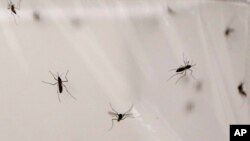Well, gee whiz. Is this “news”? Of course not! But our Doctor-in-Chief has decided it's in the US' “best interests” to get involved in ebola.
As for malaria, it's carried by air borne insects that breed in swamps. All that is needed is an extensive surge of spraying these swamps with DDT to wipe them out.
Gasp! DDT? What a horrid thought. Using a banned substance that scientists say is not really responsible for all the horrors claimed to it.
Anyhow, read the article @ Ebola is deadly but malaria steals more lives Al Jazeera America
Yet the World Health Organization’s most recent statistics on malaria suggest that every 30 seconds someone in Africa succumbs to the disease, which is transmitted through mosquito bites.
"In 2012, 90 percent of the world's malaria deaths occurred in Africa and about 460,000 African children died before their fifth birthdays," the WHO 2013 malaria report said.
As for malaria, it's carried by air borne insects that breed in swamps. All that is needed is an extensive surge of spraying these swamps with DDT to wipe them out.
Gasp! DDT? What a horrid thought. Using a banned substance that scientists say is not really responsible for all the horrors claimed to it.
Anyhow, read the article @ Ebola is deadly but malaria steals more lives Al Jazeera America






